‘You'll get more with Gore'
By ADRIAN TAHOURDIN
What sort of a politician would Gore Vidal have made? I occasionally asked myself this question over the years as I read another broadside against the US military-industrial complex, another lobbed insult at whoever was president at the time, another lavishly laid-out conspiracy theory, from the pen of America’s most acerbic political and cultural commentator.
As is well known, he ran for office twice as a Democrat, the first time for the House of Representatives in 1960. “You’ll get more with Gore” was his campaign slogan – as he writes in a caption to a photo in his memoir Palimpsest (1995), “No one could figure out what there would be ‘more’ of, but since after a dozen years in Congress the incumbent representative was unknown to his constituents, more of anything would have been an improvement”. He did creditably but, he later revealed, he was campaigning on a ticket of “greed and vanity”. In 1982 he ran unsuccessfully for the Democratic primary in California, but polled some 500,000 votes, apparently without any campaign funding. But these were the early Reagan years, with the Republicans firmly in control. That marked the end of the political career.
It’s hard to imagine Vidal would have made much of a fist of it: too cynical about what’s required to succeed, too socially radical and probably not sufficiently concerned with the “ordinary voter’s” grievances – he was after all “born to the purple”, in Clive James’s phrase. But it might have been entertaining. I sense that writers on the whole don’t make good politicians although a good number of politicians have over the years thought highly of their literary skills.
These thoughts were prompted by the screening of Nicholas Wrathall’s 90-minute film Gore Vidal: The United States of Amnesia (2013) at the ICA last night (the ICA is running an excellent documentary series – last month I blogged about their screening of a new offering from the French filmmaker Raymond Depardon). Maybe the title of the film could have been more imaginatively chosen – it seems rather a tired Vidalian quip, funny once upon a time. The screening was sparsely attended, which suggests that Vidal (who died in 2012) is receding from memory; that would be a shame as the film showed him to have been remarkably prescient about the US’s ability to make enemies, in the Middle East in particular, and as sharp as a tack until very late on, rolling his eyes as he watched Barack Obama in his acceptance speech in 2008 talking of the United States as a country where anything was possible.
Wrathall splices historical interviews and film – I had never before seen footage of Vidal’s blind grandfather, the reform-minded Senator Tipper Gore, who was such a formative influence – with his own more recent work, dating back to 2005 (we see Vidal leave his Ravello eyrie for the last time two years after the death of his long-time partner Howard Auster – “there is nothing more dispiriting than packing up”). There must have been a time when Vidal was scarcely ever off TV screens in the US and he was certainly a very telegenic performer, trading blows with the conservative columnist William Buckley Jr over Vietnam and (improbably) over feminism with Norman Mailer, pouring scorn on the neocons, publicly humiliating his rival for the Democrat ticket in 1982 Jerry Brown (now Governor of California for a second time, of course), or heaping praise on Mikhail Gorbachev. We see the waspish wit, the exquisite timing, the blue silk shirts. The film reminds us of the fact that Vidal seems to have known everyone. Here is JFK, Tennessee Williams, Paul Newman, Tim Robbins, Hillary Clinton . . . . At one point, the late Christopher Hitchens sidles up to the wheelchair-bound Vidal at a book signing in Washington, but Hitchens had by then joined the pro-Iraq war camp and was less of an “anointed dauphin” to the great provocateur than he had previously been. Hitchens mentions Vidal's fondness for conspiracy theories which many found unpalatable if not irresponsible, such as the idea that FDR was complicit in the attack on Pearl Harbor.
Jay Parini, Vidal’s literary executor, talks interestingly about Vidal’s American historical novels (which I have to confess I have never tried to read), rating Burr a “masterpiece”, while Hitchens also appeared to have a high regard for them. Many readers (myself included) have found the later, scabrous novels – Myra Breckinridge, Duluth and so on – hard to read: too self-consciously knowing (postmodernist maybe), the humour rather heavy. But it can't be denied that Vidal kicked off with an impressive quintet of books, utterly diverse in theme and content.
Vidal had published his first novel, Williwaw (above), in 1946, when he was twenty-one, a tightly written and remarkably precocious novel which drew on his own experience on a US Army freight ship in the Aleutian Islands (North Atlantic) during the closing months of the war. He gives the impression of never having needed to be taught how to write a sentence of prose. Williwaw was followed by the novel of post-war adjustment In a Yellow Wood. After that came the controversial homosexual-themed The City and the Pillar, the surely autobiographical account of a difficult mother-son relationship The Season of Comfort and the imaginative reconstruction of Richard the Lionheart’s return to England in A Search for the King. Not bad for openers.
But the essays have tended to be the highpoint in many readers’ estimation. The TLS published a few over the years, on Ford Madox Ford, Lawrence Durrell and Henry Miller, Charles Lindbergh, Montaigne – quite a range.
Oh, and while we're on the subject of the TLS, we recently ran a correspondence about "cats on shoulders" (which, as Letters editor, I perhaps over-indulged). Well, here’s just one more, from 1992 (taken from Palimpsest).
Peter Stothard's Blog
- Peter Stothard's profile
- 30 followers






